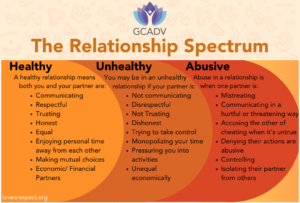
Relationships are complex and this is especially true in relationships of teenagers. Teens are on the cusp of adulthood, while still only having minimal lived experiences with limited access to freedom. Relationships can feel like a responsibility and freedom like they’ve never felt before, making it easy to become isolated in their relationships. It’s important for teens to know that they are not alone in their relationships if they feel like it is slipping into the unhealthy and abusive territory.
Healthy Relationship Foundatings:
- Set and Communicating Boundaries in your relationships. To create a safe and respectful environment, both partners must have boundaries that are comfortable and valued. It is completely normal for these boundaries to be crossed at some times, as long as you are able to communicate that it made you uncomfortable and your partner honors and respects it. Reversely, respect and honor when your partner expresses concerns or their uncomfortability about a topic or action.
- Prioritizing Self-Care in your relationships. It’s important to maintain a sense of self in a relationship. It’s easy to get wrapped up in the love of the relationship that it becomes your entire life, but you must have a sense of individuality outside of the relationship. If it seems like you and your partner are struggling with codependcy, use boundaries setting as a starting conversation about expectations of alone time and then practice conflict management if there are disagreements.
- Understanding How to Handle Disagreements and Conflicts. It is absolutely normal for there to be conflicts and disagreements in a relationship. In fact, it would be very unusual for a relationship to NEVER have any kind of conflict. However, it is about how you resolve the disagreements that build the foundation of relationships. It’s about treating each other with respect, actively listening, and working together towards a resolution. Insults or belittling during conflict is a form of emotional abuse and it is not a healthy way to solve the issues. You should never feel afraid to express yourself and your relationship should be a safe space to do so.
- Recognizing Signs of Abuse for yourself and others. Relationships are complex and will look different to each person, but they should never be harmful. Abuse can take shape in many different ways including one or more of the following: Physical, Emotional, Financial, Digital, or Verbal abuse. It can be threatening or enacting physical harm, isolating you from friends and family, controlling your finances, “stalking” your social media or digital footprint, or degrading you. If you recognize one sign, it is possible for there to be more. For information about Domestic Violence, please click here.
- Seek Support if you need it. You are not alone. If you are struggling in your relationship or have experience abuse or trauma, it’s important to reach out to someone. This could be trusted friends or family, counselor, or domestic violence advocate who can help guide and provide assistance. There are resources available to you.
How to prevent teen dating violence:
- Look for warning signs: if someone you know starts having multiple injuries, a decrease in motivation, drop in grades, or loss interest in activities could be a result of dating violence.
- Act on warning signs: if you notice warning signs, act on them. Speak to the individual about getting help through talking to an adult or seeking counsel. As well as using resources such as dating violence hotlines.
- Be supportive: it is important for the individual to feel loved and supported, especially when they have been in an abusive relationship.
- Educate: it is important for teens to be educated and understand what teen dating violence is and the impacts it can have on well-being. It is also important for teens to be educated on the resources available if they experience dating violence.
Resources:
- Love is Respect
loveisrespect.org
National Hotline: 1-800-331-9474 - Breaking Silence
project-safe.org
GA Teen Textline: 706-765-8019 - Georgia Coalition Against Domestic Violence
gcadv.org
Statewide Hotline: 1-800-334-2836 - National Domestic Violence Hotline
thehotline.org
1-800-799-7233
